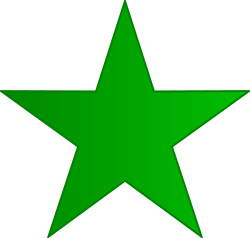Esperanto
English[edit]

Etymology[edit]
Learned borrowing from Esperanto Esperanto. Originally, this was the pseudonym assumed by the language's creator, L. L. Zamenhof, and the language was called Lingvo Internacia (“international language”). The term first appears in the publication Science in 1892.
Pronunciation[edit]
- (Received Pronunciation) IPA(key): /ˌɛspəˈɹæntəʊ/, /ˌɛspəˈɹɑːntəʊ/
- (General American) IPA(key): /ˌɛspəˈɹæntoʊ/, /ˌɛspəˈɹɑntoʊ/
Audio (US) (file) Audio (UK) (file) - Rhymes: -æntəʊ, -ɑːntəʊ
Proper noun[edit]
Esperanto
- An international auxiliary language designed by L. L. Zamenhof with a base vocabulary inspired by Indo-European languages such as English, French, German, Italian, Spanish, and Russian, and having a streamlined grammar with completely regular conjugations, declensions, and inflections.
- (figuratively) Anything that is used as a single international medium in place of plural distinct national media.
- The U.S. dollar is the Esperanto of currency.
- 1923, Edward Sims Van Zile, “The Movie as a World Language”, in That Marvel—the Movie, page 193:
- [Compared] to the Esperanto of the Eye, [cinema], [Esperanto's] conquest of the Earth is painfully slow[.]
- 1981, Ellen Goodman, “Where did all the accents go?”, in Sarasota Journal[1], page 6A:
- I think there is increasingly a homogenized voice, an Esperanto in the ear.
- 1994, Terry Pratchet, Interesting Times:
- […] making its usual explicit request in the Esperanto of brutality.
- 2022, James Brooke-Smith, Accelerate!: A History of the 1990s[2], The History Press, →ISBN:
- There may have been a few slippages when the show's American English was translated for foreign audiences—Alerte à Malibu! Mishmar Ha-Mifratz!—but the theme song was pure Esperanto, a joyous surge of energy and desire that was instantly comprehensible from Quito to Tehran.
Quotations[edit]
- For quotations using this term, see Citations:Esperanto.
Derived terms[edit]
Translations[edit]
|
See also[edit]
- Category:Esperanto language
- Appendix:Esperanto Swadesh list for a Swadesh list of basic vocabulary words in Esperanto
Further reading[edit]
- Reta Vortaro (short : ReVo) a multingual dictionary with esperanto definitions and translations in many languages. See also ReVo
- ISO 639-1 code eo, ISO 639-3 code epo (SIL)
- Ethnologue entry for Esperanto, epo

- Akademio de Esperanto
Anagrams[edit]
Dutch[edit]
Etymology[edit]
Borrowed from Esperanto Esperanto.
Pronunciation[edit]
Proper noun[edit]
Esperanto n
Derived terms[edit]
Esperanto[edit]
Etymology[edit]
From Doktoro Esperanto ("Doctor Hopeful"), the pen-name of Esperanto's author, Dr. Ludwik Łazarz Zamenhof, when he published the language in 1887; from esperanto (“one who hopes”), from the verb esperi (“to hope”), from French espérer, Spanish esperar, ultimately from Latin spērō (“to hope”).
Pronunciation[edit]
Proper noun[edit]
Esperanto (accusative Esperanton)
Derived terms[edit]
- esperanta (“of or relating to Esperanto”)
- esperantano (“proponent of Esperanto”)
- Esperantido (“offshoot of Esperanto”)
- esperantigi (“to translate or transliterate to Esperanto”)
- Esperantio, Esperantujo (“notional land of Esperantists”)
- esperantismo (“the ideal of a neutral, universal auxiliary language”)
- esperantistiĝi (“to become an Esperantist”)
- esperantisto (“active user of Esperanto, Esperantist”)
- esperantologio (“linguistic study of Esperanto, Esperantology”)
- esperantologo (“specialist in Esperantology, an Esperantologist”)
- esperantumado (“use of Esperanto, Esperanto-related activities”)
German[edit]
Pronunciation[edit]
Proper noun[edit]
Esperanto n (proper noun, strong, genitive Esperantos or Esperanto)
Usage notes[edit]
- The word can be used with or without a definite article: (Das) Esperanto ist eine Kunstsprache. (“Esperanto is a constructed language.”) The form with no article is generally more common, but the article is necessary in the genitive case (e.g. die Grammatik des Esperanto) and with the preposition in (e.g. die Pluralbildung im Esperanto).
Further reading[edit]
- “Esperanto” in Duden online
Ido[edit]
Etymology[edit]
Borrowed from Esperanto Esperanto.
Pronunciation[edit]
Proper noun[edit]
Esperanto
Synonyms[edit]
Derived terms[edit]
See also[edit]
Interlingua[edit]
Noun[edit]
Esperanto
Italian[edit]
Noun[edit]
Esperanto m (uncountable)
See also[edit]
Anagrams[edit]
Romanian[edit]
Noun[edit]
Esperanto n (uncountable)
- Alternative letter-case form of esperanto
Tagalog[edit]
Etymology[edit]
Borrowed from Spanish esperanto or English Esperanto.
Pronunciation[edit]
Noun[edit]
Esperanto (Baybayin spelling ᜁᜐ᜔ᜉᜒᜇᜈ᜔ᜆᜓ)
- Esperanto (language)
Derived terms[edit]
Turkish[edit]
Etymology[edit]
Proper noun[edit]
Esperanto
- English terms derived from Proto-Indo-European
- English terms derived from the Proto-Indo-European root *speh₁-
- English terms borrowed from Esperanto
- English learned borrowings from Esperanto
- English terms derived from Esperanto
- English 4-syllable words
- English terms with IPA pronunciation
- English terms with audio links
- Rhymes:English/æntəʊ
- Rhymes:English/æntəʊ/4 syllables
- Rhymes:English/ɑːntəʊ
- Rhymes:English/ɑːntəʊ/4 syllables
- English lemmas
- English proper nouns
- English uncountable nouns
- English terms with usage examples
- English terms with quotations
- en:Artificial languages
- Dutch terms borrowed from Esperanto
- Dutch terms derived from Esperanto
- Dutch terms with IPA pronunciation
- Dutch terms with audio links
- Dutch lemmas
- Dutch proper nouns
- Dutch neuter nouns
- Dutch eponyms
- nl:Artificial languages
- Esperanto terms derived from French
- Esperanto terms derived from Spanish
- Esperanto terms derived from Latin
- Esperanto terms with IPA pronunciation
- Esperanto terms with audio links
- Rhymes:Esperanto/anto
- Esperanto lemmas
- Esperanto proper nouns
- eo:Artificial languages
- German 4-syllable words
- German terms with IPA pronunciation
- German terms with audio links
- German lemmas
- German proper nouns
- German neuter nouns
- de:Artificial languages
- Ido terms borrowed from Esperanto
- Ido terms derived from Esperanto
- Ido terms with IPA pronunciation
- Ido lemmas
- Ido proper nouns
- Interlingua lemmas
- Interlingua nouns
- ia:Artificial languages
- Italian lemmas
- Italian nouns
- Italian uncountable nouns
- Italian masculine nouns
- it:Artificial languages
- Romanian lemmas
- Romanian nouns
- Romanian uncountable nouns
- Romanian neuter nouns
- Tagalog terms borrowed from Spanish
- Tagalog terms derived from Spanish
- Tagalog terms borrowed from English
- Tagalog terms derived from English
- Tagalog 4-syllable words
- Tagalog terms with IPA pronunciation
- Tagalog lemmas
- Tagalog nouns
- Tagalog terms with Baybayin script
- Turkish terms borrowed from Esperanto
- Turkish terms derived from Esperanto
- Turkish lemmas
- Turkish proper nouns
- tr:Artificial languages


